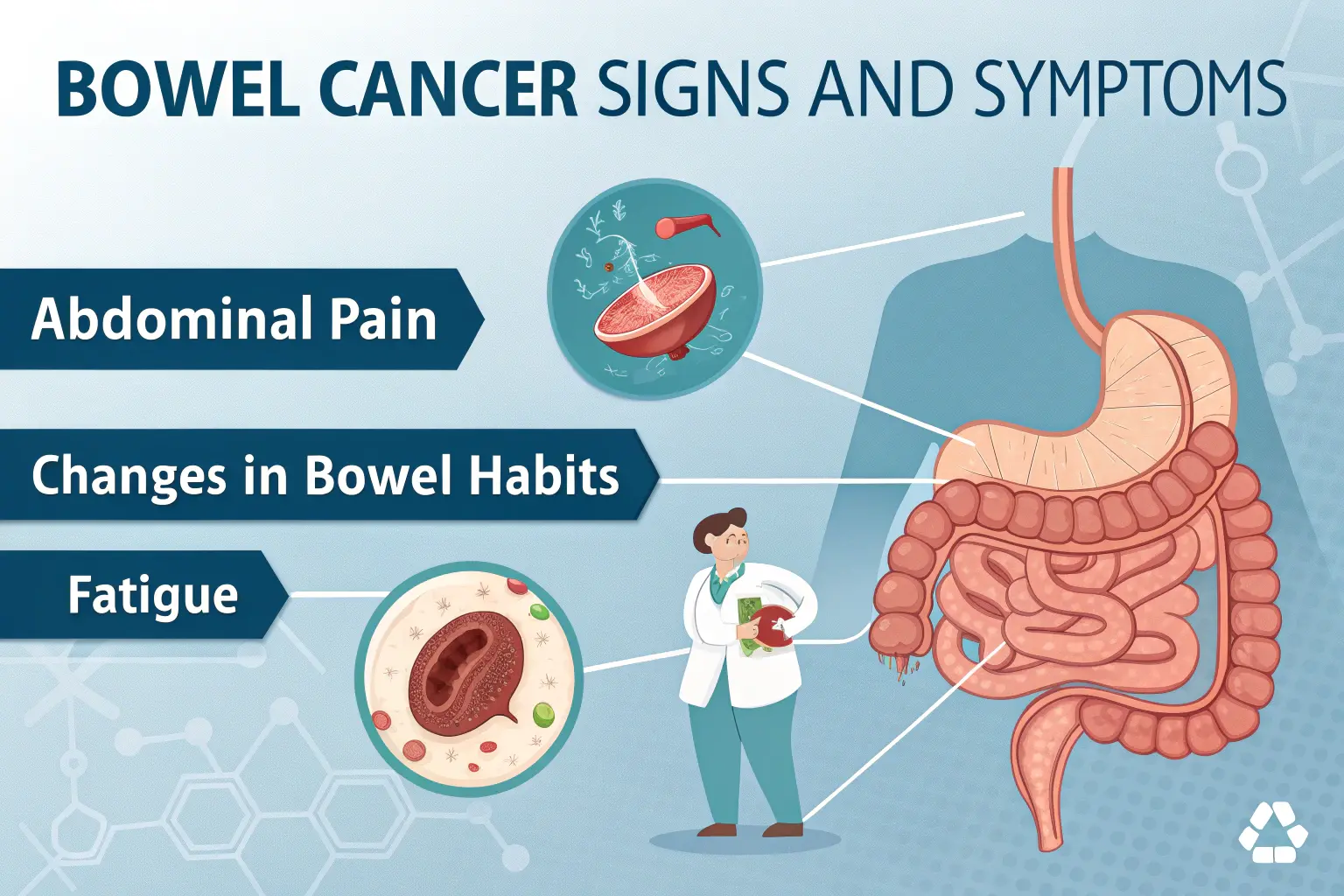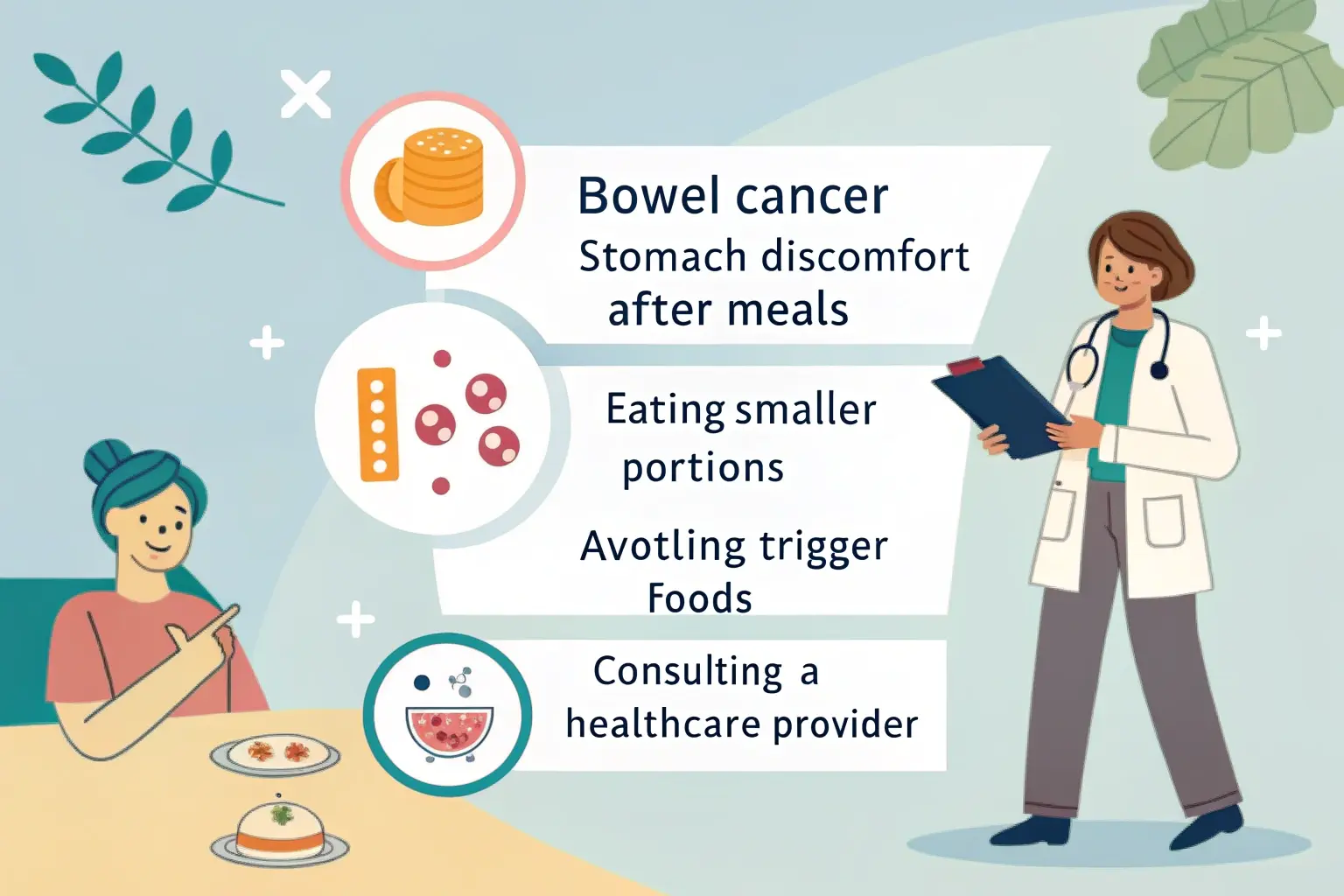
Bowel Cancer Stomach Noises After Eating: Warning Signs
Need Personalized Advice?
Our medical experts are ready to answer your questions and guide you through your treatment options.
Bowel Cancer Stomach Noises: Understanding the Warning Signs
Unusual stomach sounds can indicate serious underlying health conditions, particularly when they persist or intensify after meals. The relationship between bowel cancer stomach noises, and digestive health plays a vital role in early detection and appropriate medical intervention.
These abnormal sounds, medically termed borborygmi, may signal gastrointestinal issues requiring immediate medical evaluation. When combined with additional symptoms, stomach gurgling bowel cancer associations become medically significant.
What Are Bowel Cancer Stomach Noises?

Bowel cancer stomach noises represent abnormal digestive sounds resulting from intestinal obstruction or altered bowel function. These sounds differ substantially from normal digestive gurgling patterns.
There is a regular stomach sound through peristalsis - rhythmic muscle contractions that transport food through the digestive system. The growth of cancer can significantly disrupt this natural process.
Cancers growing in the colon or rectum can cause partial obstruction in the intestinal tract. This resistance causes the digestive system to work harder, which creates increased and louder gastrointestinal sounds.
The loudness and frequency of these sounds typically increase after eating as the digestive system works to pass the contents of the stomach around the obstruction area.
Why Does Bowel Cancer Cause Stomach Noises After Eating?
When exploring how tumors impact the digestive system, the association between bowel cancer symptoms and stomach sounds becomes clear. After eating, digestive activity in the intestines markedly increases to mix, break down, and transport food.
Tumors create physical obstacles within the intestinal tract. As food passes these obstructions, the muscles surrounding the obstruction contract more forcibly to propel contents through the constricted opening.
This increase in muscular activity results in a noisier, more noticeable sound than digestion is typically associated with, and may also present with cramping, bloating, or some discomfort.
Bowel cancer digestion problems after eating can cause food accumulation before the obstruction site. This backup creates pressure and irregular movement patterns, contributing further to abnormal sounds.
The time of these noises is medically important - they usually appear from 30 minutes to 2 hours after meals, when the digestive activity reaches an extreme level.
How Do Bowel Cancer Signs and Symptoms After Eating Manifest?

Recognizing bowel cancer after eating symptoms requires understanding the complete symptom profile. Stomach noises rarely occur in isolation.
Common accompanying symptoms include:
Abdominal cramping that intensifies following meals, particularly with larger or high-fiber foods. The pain may resemble waves corresponding to intestinal contractions.
Bloating and distension become more pronounced after eating. This occurs as gas and food contents accumulate behind partial obstructions.
Changes in bowel habits ,including constipation, diarrhea, or alternating between both conditions. These changes often correlate with meal timing and food types.
Nausea or vomiting may develop when the obstruction becomes more severe. This typically occurs several hours after eating, as food cannot pass normally.
The combination of stomach gurgling bowel cancer symptoms with these digestive issues warrants immediate medical evaluation.
Are Abnormal Bowel Sounds in Bowel Cancer Patients Always Present?
Not all bowel cancer patients experience abnormal bowel sounds in bowel cancer patients' scenarios. The presence and intensity depend on several medical factors.
Tumor location significantly influences sound production. Cancers in the ascending colon may produce different sounds compared to those in the sigmoid colon or rectum.
Tumor size and growth pattern also affect symptoms. Smaller tumors or those growing into the bowel wall may not cause significant obstruction initially.
Cancer stage affects symptom presentation. Early-stage cancers may produce subtle changes, while advanced tumors typically cause more pronounced symptoms.
Individual digestive patterns vary considerably. Some patients naturally produce more intestinal sounds, making abnormal changes harder to detect.
When bowel cancer stomach noises and pain occur together, especially with progressive worsening, medical investigation becomes essential.
What Does Bowel Cancer Stomach Noises Treatment Involve?
Bowel cancer stomach noises treatment focuses on addressing the underlying cancer while managing symptoms. Treatment approaches vary based on cancer stage and patient condition.
Surgical intervention remains the primary treatment for localized bowel cancer. Removing the tumor eliminates the obstruction causing abnormal sounds.
Chemotherapy may shrink tumors before surgery or treat cancer that has spread. As tumors respond to treatment, digestive symptoms often improve.
Radiation therapy can reduce tumor size in specific cases, particularly for rectal cancers. This may provide symptom relief while preparing for surgery.
Palliative care helps manage symptoms when curative treatment isn't feasible. This includes medications to reduce cramping and improve bowel function.
Dietary modifications support treatment by reducing digestive stress. Smaller, more frequent meals and avoiding gas-producing foods provide relief.
DivinHeal provides comprehensive cancer treatment options in India, combining advanced medical care with personalized patient support throughout the treatment journey.
How Is Bowel Cancer Stomach Noises Diagnosis Performed?
Bowel cancer stomach noises diagnosis requires systematic evaluation combining clinical assessment with diagnostic testing. Healthcare providers use multiple approaches to reach accurate conclusions.
Medical history review examines symptom patterns, family history, and risk factors. Doctors pay particular attention to changes in digestive patterns and associated symptoms.
Physical examination includes abdominal palpation and auscultation. Healthcare providers listen for abnormal bowel sounds and assess for masses or tenderness.
Laboratory tests may reveal anemia, elevated inflammatory markers, or other changes suggesting bowel cancer. Fecal occult blood tests can detect hidden bleeding.
Imaging studies provide detailed views of the digestive tract. CT scans, MRI, or ultrasound can identify masses, obstructions, or other abnormalities.
Colonoscopy remains the gold standard for bowel cancer diagnosis. This procedure allows direct visualization of the colon interior and tissue sampling when needed.
Early diagnosis significantly improves treatment outcomes and symptom management effectiveness.
What Do Bowel Cancer Stomach Noises Mean for Prognosis?
Gaining an understanding of bowel cancer noise from the stomach will enable patients and families to be better prepared for the treatment journey ahead. These symptoms relate to specific characteristics of the disease.
The presence of obstructive (or obstructive symptoms) features, including sounds in either joint of the abdomen, may mean a more advanced local disease. However, it does not mean a poor prognosis with appropriate treatment or intervention.
Symptom onset timing provides prognostic information. Gradually developing symptoms may indicate slower-growing tumors, while a rapid onset suggests more aggressive disease.
Response to initial treatment often correlates with overall outcomes. Patients whose digestive symptoms improve with treatment typically have better long-term prospects.
Associated complications like complete obstruction or perforation require immediate intervention, but don't preclude successful treatment.
Modern cancer treatment approaches have dramatically improved outcomes for bowel cancer patients, even when presenting with obstructive symptoms.
How Can Bowel Cancer Stomach Discomfort After Meals Be Managed?

Managing bowel cancer stomach discomfort after meals requires both medical treatment and lifestyle adjustments. Effective strategies address immediate symptoms while supporting overall treatment goals.
Dietary modifications form the foundation of symptom management. Smaller, more frequent meals reduce digestive burden and minimize discomfort.
Food texture considerations help navigate partial obstructions. Softer, easily digestible foods pass more readily through narrowed intestinal passages.
Timing strategies involve eating main meals earlier in the day when digestive function is typically at its best. Light evening meals reduce overnight discomfort.
Hydration maintenance supports digestion and helps prevent constipation. Adequate fluid intake becomes especially important with dietary changes.
Medication management may include anti-spasmodics, prokinetic agents, or pain relievers as prescribed by healthcare providers.
Stress reduction techniques support digestive function. Practicing relaxation techniques before and after meals can help improve comfort levels.
When Should Bowel Cancer Digestive Symptoms After Eating Prompt Emergency Care?
Certain bowel cancer digestive symptoms after eating require immediate medical attention. Recognizing emergency warning signs prevents serious complications.
Complete inability to pass gas or stool suggests complete intestinal obstruction requiring urgent surgical evaluation.
Severe, unrelenting abdominal pain that doesn't respond to position changes or medications may indicate perforation or severe obstruction.
Persistent vomiting with inability to keep fluids down leads to dehydration and electrolyte imbalances requiring immediate treatment.
Abdominal distension that increases rapidly or becomes severe may signal dangerous pressure buildup within the intestines.
Signs of systemic illness, including fever, rapid heart rate, or altered mental status, suggest serious complications needing emergency intervention.
Rectal bleeding combined with obstructive symptoms requires immediate evaluation to assess severity and potential complications.
Early intervention during emergencies significantly improves outcomes and prevents life-threatening complications.
Conclusion
Bowel cancer stomach noises shouldn't be ignored, especially when they differ from normal digestive sounds. While not every unusual stomach gurgle indicates cancer, persistent changes combined with other symptoms deserve medical attention.
Early detection saves lives. Patients experiencing ongoing digestive changes, loud stomach noises after eating, or any concerning symptoms should consult healthcare professionals promptly.
Ready to Take Medical Action?
Patients experiencing persistent stomach noises along with other concerning symptoms should seek medical evaluation promptly. Early detection can significantly impact treatment outcomes.
Recommended next steps:
Schedule a consultation with a gastroenterologist if digestive pattern changes persist beyond two weeks.
Keep a symptom diary noting when sounds occur, foods consumed, and any accompanying symptoms. This information proves valuable for healthcare providers.
Trust medical instincts - patients often recognize when something feels different or concerning about their health.
Consider family history and discuss any hereditary risk factors with medical professionals during appointments.
At DivinHeal, experienced medical teams in India provide comprehensive cancer screening and treatment services, combining advanced technology with compassionate care to support patients throughout their medical journey.
Taking the first step toward medical evaluation is crucial for health outcomes.
Send your reports to DivinHeal for expert guidance, personalized treatment support, and seamless access to India’s top bowel cancer specialists.
Latest Articles
Get Your Free Medical Quote!
Connect with our medical experts for personalized treatment plans and cost estimates.
Frequently Asked Questions
Get answers to common questions about medical tourism, treatment procedures, and our comprehensive healthcare services.
Ready To Start Your Healing Journey?
Get Personalized Medical Treatment Options From India's Top Hospitals. Our Medical Experts Are Ready To Assist You Every Step Of The Way.